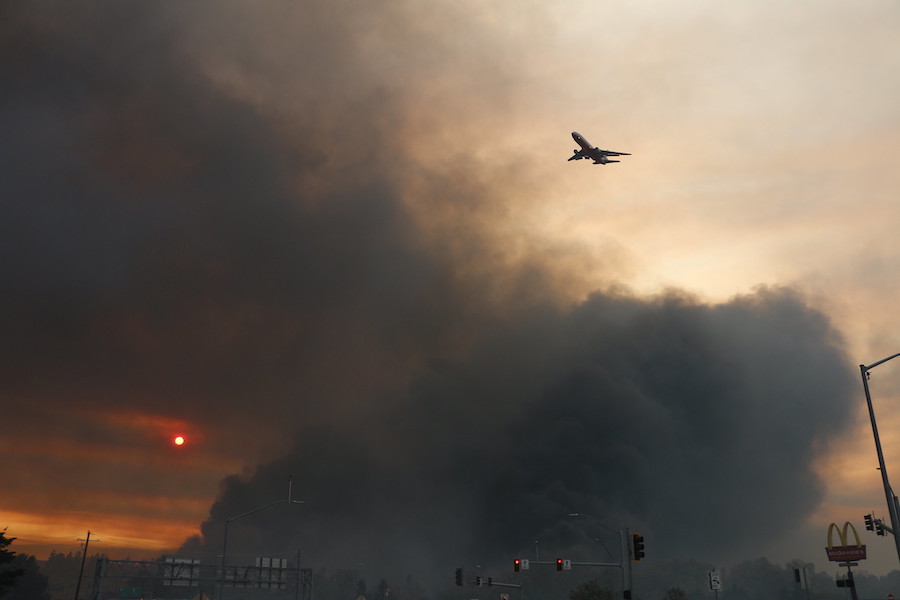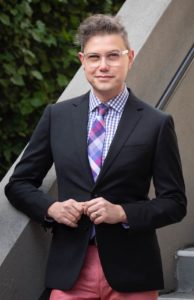Oregon Shakespeare Festival artistic director Nataki Garrett (she/her) had plenty to do on the day the Almeda wildfire started last month. Theatres around the country have been shut down since March due to COVID-19, forcing many companies to move any programming they have online. The end of May brought another major national reckoning for all citizens, including artists, with the murder of George Floyd in Minneapolis. Every system that exists in the United States was placed under a microscope, and theatres have faced their own reckoning, with artists demanding equity in the ranks, and many theatres coming forward with solidarity statements.
Garrett had a full slate of meetings in her calendar for Sept. 8. But as the fire began to threaten Ashland, Ore., after powering through the nearby cities of Phoenix, Talent, and the outskirts of Medford, it was clearly time to change course.
Garrett and her new leadership team, which includes executive director David Schmitz (he/him) and associate artistic director Evren Odcikin (he/him), were ready to mobilize, with their own to-go bags placed in their cars in case of a mandatory evacuation. The specific jobs the three were hired to do would have to wait for another day. Making the theatre company’s facilities the epicenter of a refuge from disaster was the company’s new priority.
“It was very clear to us that our role is to pivot and be supportive of the community we live in,” said Schmitz, who came to Ashland on Aug. 24 after serving in multiple positions, including executive director at Steppenwolf Theatre Company in Chicago for 15 years. “Like any moment, it’s critical to articulate focus first. I think we did that, and then it was a matter of figuring out where we could best utilize our resources.”
Southern Oregon’s Rogue Valley is home to a wide-ranging community of citizens. In addition to the hundreds of people who make their employment with the company, which boasts three theatres that seat as few as 270 and as many as 1,190 patrons, it is also home to a large immigrant community and others seeking affordable housing and employment in industries such as agriculture, hotels, and restaurants.
Wildfires are nothing new to the state or to OSF patrons. In 2018, nearly a million acres burned across Oregon, California, and Washington, which caused the cancellation and displacement of a combined 26 performances. The company’s Green Show, a free event that runs six nights a week, was also canceled outright that same year. But this has been a West Coast fire season unlike any other in recent memory. Fires have devastated lives, homes, and property. A battering of wildfires in Northern California covered the entire San Francisco Bay Area in an apocalyptic orange hue, an ominous sky that made a valiant attempt on Sept. 9 to camouflage the Golden Gate Bridge.

The day before, the Almeda fire started in Southern Oregon and was driven by high winds and low humidity, ultimately destroying at least 2,357 structures and killing three people in the course of a week, according to the Jackson County Sheriff’s Office. Those structures include more than 2,000 residential units: houses, mobile homes, and apartments.
Many of those who lost homes were furloughed in March due to the pandemic—people who served the OSF community in multiple capacities, as ushers, costume shop workers, and goodwill ambassadors, to name a few. A number of OSF’s resources not only went to support the Southern Oregon community at large, but to provide respite for many on their own staff. On the company’s website, 22 crowd-sourced fundraisers for various company members are posted for those who want to donate.

The combination of the wildfires and COVID-19 formed a perfect storm for what would have been Garrett’s inaugural season, which looked beautiful on paper. She had arrived in Ashland with a fantastic theatre pedigree. An alumnus of the prestigious California Institute of the Arts with a MFA in directing, Garrett spent 10 years at her alma mater, serving as the associate artistic director of the CalArts Center for New Performance. Her passion for new work saw her lead world premieres from playwright heavyweights such as Lauren Gunderson, Matthew Lopez, Lauren Yee, José Cruz González, and Katori Hall. She took the helm of OSF as the sixth artistic director of a company founded in 1935; she is only the second woman, and the first person of color, to hold the post in the organization’s history.
Yet her transition to leadership in the midst of a crisis has a precedent of sorts, one rooted in her upbringing in the blue-collar East Bay Area town of Oakland, Calif.
“My dad was a Civil Rights worker and I come from a family of organizers—seeing them create spaces to enfranchise people got in my blood,” said Garrett. “All of my influences growing up sculpted me, folded in from my family and neighbors, which informed my upbringing. There’s a responsibility to take care of people around you, and I don’t know many people from Oakland that don’t feel that way.”
“Faced with actual natural disaster, of course our approach has to be how we can be of service. That feels very clear in this moment and that part is actually easy.”
Odcikin, who left his home in San Francisco and followed Garrett to Ashland to join the Rogue Valley community and live full-time as an Oregonian, is not shy about stating the fact that his post at OSF is a dream job. He admits to being sad that Garrett’s first season at the helm has gone the way of other shuttered seasons around the theatre community, but his unwavering hopes for the future and the company’s current mission do not let him get too down.

“I’m not going to mince my words, to not say I have to go through moments of mourning for the season we didn’t have or the seasons we are not going to do in the next year,” said Odcikin, who was born and raised in Turkey and has directing credits across the nation. “Having said that, maybe it’s because I come from a smaller-theatre background, maybe because I’m an immigrant, maybe because I’m just an eternal optimist, what I want in this position for myself and what I want for the community and nationally is to be of service. Faced with actual natural disaster, of course our approach has to be how we can be of service. That feels very clear in this moment and that part is actually easy.”
Service to the community meant turning the entire OSF campus, including theatres and rehearsal rooms, into a location where folks could have access to little things: a place to get inside from the smoke, enjoy a meal, charge their phones. Carpenter Hall, a space often used for events and educational programming, was transformed into a robust donation center open six days a week. The center is thriving, providing a critical lifeline to the community.
In an ironic turn of events, even the pandemic did its part to help. For those who lost housing, the company had plenty of apartment space that was available because visiting artists are not present for the cancelled season. According to Schmitz, the company has been able to house 60 families in those empty units, some of those being long-term situations.
“I was on the phone with key members of the community within hours of that fire and we were working together to problem solve, which is the best way to get to know somebody.”
While Garrett has not been able to showcase much of who she is as an artistic director just yet for OSF’s patrons, her new community is getting to know her in a much more important context, which is simply fine by her.
“In my first year, people have no clarity of who I am artistically because I am focused on the community and emergencies which has included the pandemic and the crisis that followed,” Garrett said. “People have lost everything they had in these fires, and what they get to learn is about who I am as a human and our shared humanity. David, Evren, and I all arrived at the same time, and the people this theatre company brought into the community are as impactful as the art they brought us in to create.”
Any time there is a pioneer or a first in a position as high-profile as leading the Oregon Shakespeare Festival, there will be pushback, whether the decisions made are artistic or crisis-related. If it’s someone who is Black, Indigenous, or a person of color (BIPOC), the pressure is only amplified. Odcikin, who is present for Garrett’s every artistic and practical move, is bullish on what her appointment means and what he will do to support her. Most critically, he has seen firsthand what this moment has revealed about her character.
“I am in a unique position, and it’s such a privilege that I get to support a Black woman in this sort of position,” said Odcikin. “And because of the enormity of what we’re facing, the difficulty of making sure that a woman, a Black woman, really succeeds in this kind of position became very acute for me. It’s something I’m thinking about a lot these days.”
Supporting each other and supporting their adopted community has become the most important aspect of running a theatre company in these times. To that end, building relationships has accelerated rapidly.

“I was on the phone with key members of the community within hours of that fire and we were working together to problem solve, which is the best way to get to know somebody,” said Schmitz. “That really accelerated my onboarding and relationship-building to the community. I’m someone that is more known in the community because of all this.”
In a normal year, the meetings that Garrett, Schmitz, and Odcikin would have had might have been all about season planning, budgets, and play development. But the needs of the community where they’ll make theatre took on a new centrality. And in the intense, emotional week that began in early September, Garrett learned some valuable lessons about the team she assembled.
“On a leadership team, you need alignment, and I will say this—crisis tells on you and basically turns the light on in the room,” said Garrett. “It shines light in every corner and crevice. The benefit of clarity in crisis is that I learn who is on my team and who’s in line with the direction I’m trying to head.”
David John Chávez (he/him) is a Bay Area-based theatre critic and reporter. He is the vice-chair of the American Theatre Critics Association. Twitter: @davidjchavez.


